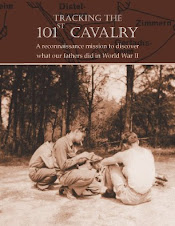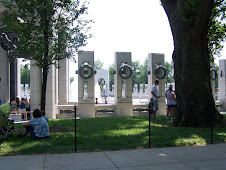

[Pictured left to right: Abe Friedman and Roy Ramuar]
I have heard from a number of people whose fathers served in World War II. They contact me, either asking for information about their fathers or wanting me to post information about their fathers on the website.
Janet Willemain of New York was one of the first to contact me, sending a few photos for the website and asking if anyone remembered her father, Bernard Willemain, a lieutenant with Troop B, 101st Squadron.
Lev Friedman’s father served in the 101st from 1940 or 1941 until 1946, when he was mustered out as a Major. He was awarded the Bronze Star.
“Certainly his experiences affected me profoundly,” said Friedman.
Bruce Peele found his father’s name listed on the site and wrote: “My father Louis Peele was in the 116th, Troop E. He was a tank gunner who served with Sgt. Pollack and was awarded a Silver Star and Purple Heart.
Peele wanted to make sure his father’s Silver Star was mentioned on the site. I hoped to interview his father; however, I received another e-mail before I could.
“My father was never sick a day in his life that I remember, and never complained about anything. However, he died on Friday. He opted not to do chemotherapy and died relatively quickly from lung cancer. My dad had an incredibly strong spiritual conviction, so for him death was as much a cause for exultation as it may have been for despair. Until the moment he died, he was more concerned about his family. I will miss him, but have the same confidence as he did about seeing each other again in the next life.”
Over and over, I find myself sharing other people’s grief. We should all be grieving, really, because, as each of these veterans dies, a piece of the larger story of World War II goes with them.
Even when we wanted to hear our fathers’ stories and asked, many of them resisted, afraid we couldn’t bear to hear what they had to say.
Lou Kiessler, whose father David Gay served in the 101st Squadron, B Troop, wrote:
“I became interested in my father’s war record when he was around seven years old. It was when Rat Patrol and other World War II television shows were popular. I would see these fictional heroes and wonder what my father had done. I ask him one time if he had ever killed anyone during the war. My dad is a gentle man and never loses his temper, but that did it. He became very upset and even grabbed me, yelling, ‘Don’t ever ask me that again.’ It was so unlike him that it even frightened my mother. She was afraid he might hurt me. I never asked him personal questions about his time in the war after that.”
There is a refrain that I have heard from a number of the children of the veterans: “I just knew there were questions you didn’t ask.”
Sheila Ramuar Abshire’s father, Roy W. Ramuar, was in Troop B, 116th Squadron, like my father. He was a truck driver and served from December 21, 1942, to November 21, 1945.
“I was in the dark about his service,” she said. “Dad didn’t want to talk about all of that with us. He was not a conventional man and not highly talkative.” Her father died on November 9, 1989, “the day the wall came down,” she notes. “We buried him on Veterans Day. It was fitting.
Like many of us, she became interested in her father’s service as she watched WWII movies as a kid. “You know,” she said, “John Wayne, Audie Murphy and the like. I love old war movies.”
“In your interviews with the men, would you mind asking if they remember the Cajun who loved to dance,” Abshire asked me. “I am almost certain that if there was a dance hall near the base that Daddy would have gone dancing every chance he got.”
“Dad was a loner and he had hard memories from the war,” said Cheryl Kashuba, Charlie Kashuba’s daughter. Charlie spent years going around and visiting the men he served with, and was even called a “professional visitor” by some of the men.
“Visiting the other men was a catalyst for him to discuss the war,” said his daughter. “He’d have terrible nightmares about things he couldn’t – or wouldn’t – share with us. He wanted to be with people who understood his sadness.”
The desire to know more doesn’t end with us. The grandchildren also write, filled with pride in the service of their grandfathers. Like their parents, they want to know more.
Janet Willemain of New York was one of the first to contact me, sending a few photos for the website and asking if anyone remembered her father, Bernard Willemain, a lieutenant with Troop B, 101st Squadron.
Lev Friedman’s father served in the 101st from 1940 or 1941 until 1946, when he was mustered out as a Major. He was awarded the Bronze Star.
“Certainly his experiences affected me profoundly,” said Friedman.
Bruce Peele found his father’s name listed on the site and wrote: “My father Louis Peele was in the 116th, Troop E. He was a tank gunner who served with Sgt. Pollack and was awarded a Silver Star and Purple Heart.
Peele wanted to make sure his father’s Silver Star was mentioned on the site. I hoped to interview his father; however, I received another e-mail before I could.
“My father was never sick a day in his life that I remember, and never complained about anything. However, he died on Friday. He opted not to do chemotherapy and died relatively quickly from lung cancer. My dad had an incredibly strong spiritual conviction, so for him death was as much a cause for exultation as it may have been for despair. Until the moment he died, he was more concerned about his family. I will miss him, but have the same confidence as he did about seeing each other again in the next life.”
Over and over, I find myself sharing other people’s grief. We should all be grieving, really, because, as each of these veterans dies, a piece of the larger story of World War II goes with them.
Even when we wanted to hear our fathers’ stories and asked, many of them resisted, afraid we couldn’t bear to hear what they had to say.
Lou Kiessler, whose father David Gay served in the 101st Squadron, B Troop, wrote:
“I became interested in my father’s war record when he was around seven years old. It was when Rat Patrol and other World War II television shows were popular. I would see these fictional heroes and wonder what my father had done. I ask him one time if he had ever killed anyone during the war. My dad is a gentle man and never loses his temper, but that did it. He became very upset and even grabbed me, yelling, ‘Don’t ever ask me that again.’ It was so unlike him that it even frightened my mother. She was afraid he might hurt me. I never asked him personal questions about his time in the war after that.”
There is a refrain that I have heard from a number of the children of the veterans: “I just knew there were questions you didn’t ask.”
Sheila Ramuar Abshire’s father, Roy W. Ramuar, was in Troop B, 116th Squadron, like my father. He was a truck driver and served from December 21, 1942, to November 21, 1945.
“I was in the dark about his service,” she said. “Dad didn’t want to talk about all of that with us. He was not a conventional man and not highly talkative.” Her father died on November 9, 1989, “the day the wall came down,” she notes. “We buried him on Veterans Day. It was fitting.
Like many of us, she became interested in her father’s service as she watched WWII movies as a kid. “You know,” she said, “John Wayne, Audie Murphy and the like. I love old war movies.”
“In your interviews with the men, would you mind asking if they remember the Cajun who loved to dance,” Abshire asked me. “I am almost certain that if there was a dance hall near the base that Daddy would have gone dancing every chance he got.”
“Dad was a loner and he had hard memories from the war,” said Cheryl Kashuba, Charlie Kashuba’s daughter. Charlie spent years going around and visiting the men he served with, and was even called a “professional visitor” by some of the men.
“Visiting the other men was a catalyst for him to discuss the war,” said his daughter. “He’d have terrible nightmares about things he couldn’t – or wouldn’t – share with us. He wanted to be with people who understood his sadness.”
The desire to know more doesn’t end with us. The grandchildren also write, filled with pride in the service of their grandfathers. Like their parents, they want to know more.





2 comments:
Melaey,
Once again I am amazed by your efforts. I have just finished reading all of your blog postings and I have no appropriate words for how much they have touched me.
All I can say is, keep up the wonderful work.
Shelia Ramuar
Melaney,
It's been a while and I wanted you to know that I am still in awe of the book. I can see you interviewing these wonderful men and their families, walking where our father's walked. I have to tell you how much I have enjoyed this manuscript and cherish it dearly. I wish you could have seen the faces of my sisters and brother when they opened their packages with your book inside. All became emotional knowing at least some of their questions would be answered. Thank you again my friend. You are a treasure!
Shelia R. Abshire
Post a Comment